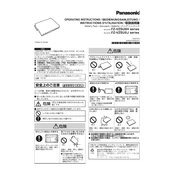Panasonic FZ-VZSU0H, FZ-VZSU0J v2 Operating Instructions


To maximize battery life, avoid extreme temperatures, keep the device on a stable surface, and perform regular full charge cycles. Additionally, adjust the brightness settings and disable unused applications and connections.
Store the batteries in a cool, dry place at around 50% charge. Avoid storing them in high temperatures or completely discharged to prevent capacity loss.
First, check the connections and ensure the power source is working. Try using a different charger if available. If the issue persists, the battery may need calibration or replacement.
Calibrate the batteries every few months by fully charging and then completely discharging the battery to maintain an accurate battery gauge.
The typical lifespan is around 300-500 full charge cycles, which is about 1-2 years of regular usage, depending on how well the battery is maintained.
Dispose of batteries at a certified e-waste recycling facility. Do not throw them in regular trash to avoid environmental harm.
It is recommended to use the charger specified by Panasonic to ensure compatibility and safety. Using a different model could lead to damage or reduced efficiency.
Signs include significantly reduced battery life, the device not holding a charge, swelling of the battery, or visible damage.
Yes, it is generally safe to use the device while charging, but it may lead to increased temperature and slightly longer charging times.
Check for battery-draining apps, reduce screen brightness, disable unnecessary connectivity options, and ensure the battery is calibrated. If issues persist, the battery may need to be replaced.